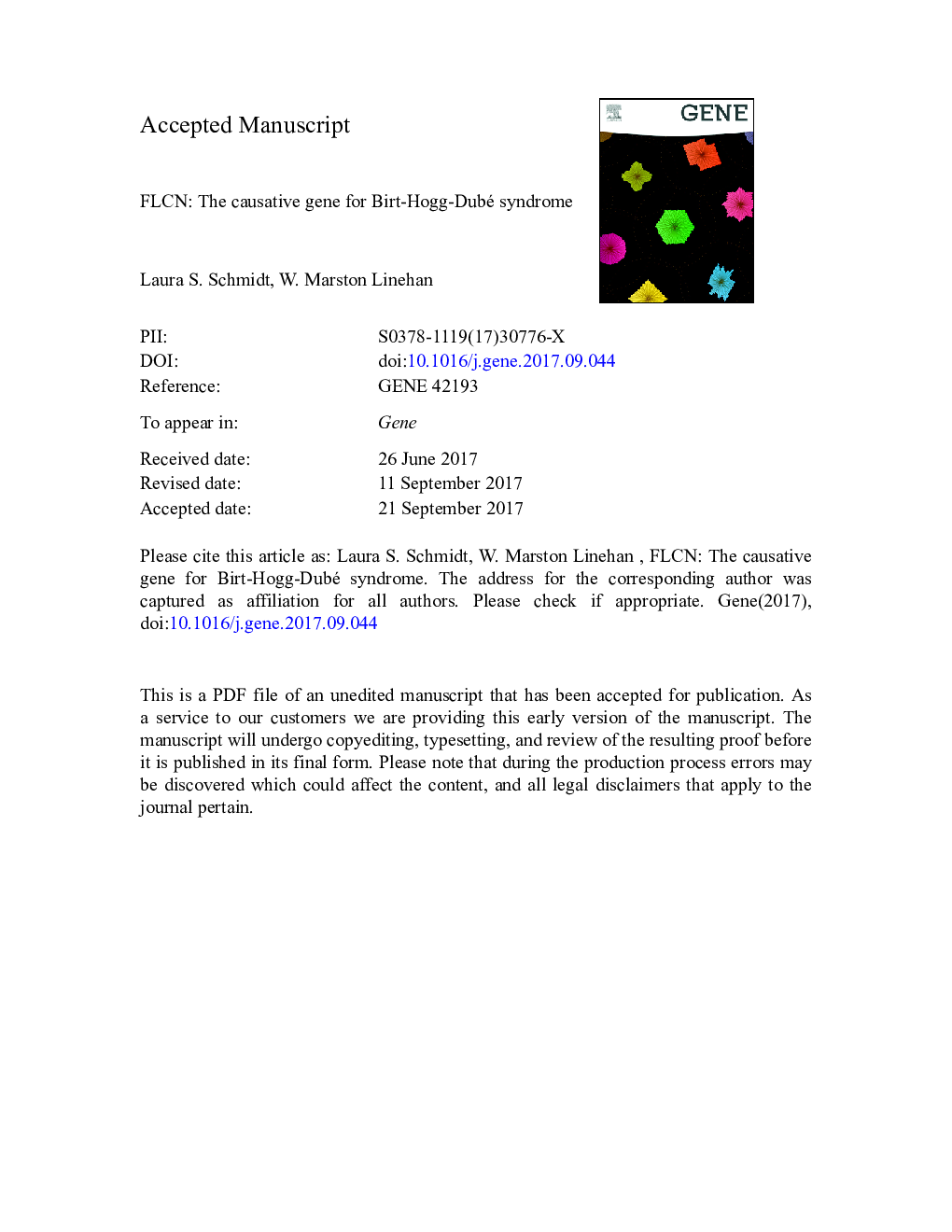| Article ID | Journal | Published Year | Pages | File Type |
|---|---|---|---|---|
| 8646078 | Gene | 2018 | 44 Pages |
Abstract
Germline mutations in the novel tumor suppressor gene FLCN are responsible for the autosomal dominant inherited disorder Birt-Hogg-Dubé (BHD) syndrome that predisposes to fibrofolliculomas, lung cysts and spontaneous pneumothorax, and an increased risk for developing kidney tumors. Although the encoded protein, folliculin (FLCN), has no sequence homology to known functional domains, x-ray crystallographic studies have shown that the C-terminus of FLCN has structural similarity to DENN (differentially expressed in normal cells and neoplasia) domain proteins that act as guanine nucleotide exchange factors (GEFs) for small Rab GTPases. FLCN forms a complex with folliculin interacting proteins 1 and 2 (FNIP1, FNIP2) and with 5â² AMP-activated protein kinase (AMPK). This review summarizes FLCN functional studies which support a role for FLCN in diverse metabolic pathways and cellular processes that include modulation of the mTOR pathway, regulation of PGC1α and mitochondrial biogenesis, cell-cell adhesion and RhoA signaling, control of TFE3/TFEB transcriptional activity, amino acid-dependent activation of mTORC1 on lysosomes through Rag GTPases, and regulation of autophagy. Ongoing research efforts are focused on clarifying the primary FLCN-associated pathway(s) that drives the development of fibrofolliculomas, lung cysts and kidney tumors in BHD patients carrying germline FLCN mutations.
Keywords
TFEBSQSTM1BHDHSP90RhoAhypoxia inducible factor alphaC. elegansBcl-2V-ATPaseTSCD. melanogasterBATmTORSchizosaccharomyces pombePGC1αFROULK1GEFTFAMMITFVHLAECAMPKIMCDFLCNEGFRDENNmultivesicular endosomeLKB1alveolar epithelial type II cellras homolog family member AERRαTGF-βtranscription factor A, mitochondrialMVEGTPS. pombeESRRBBirt-Hogg-DubeGPNMBMEFN-terminalIFTshRNAGSTsequestosome 1GTPase Activating ProteinO6-MeGSmall interfering RNAsmall hairpin RNAROSsiRNAunc-51 like autophagy activating kinase 1Adenosine TriphosphateATPamino-terminalAktvon Hippel-Lindauloss of heterozygosityWhite adipose tissuebrown adipose tissueTransforming Growth Factor BetaC-terminalGDPKidney tumorintraflagellar transportESCRabRILPserine/threonine kinase 11Embryonic stem cellBirt-Hogg-Dubé syndromeGAPTranscription factor EBguanine nucleotide exchange factorMicrophthalmia-associated transcription factorFolliculinB-cell lymphoma 2LOHmouse embryonic fibroblastDrosophila melanogasterperoxisome proliferator-activated receptor gamma coactivator-1 alphaHeat shock protein 90protein kinase BWATinner medullary collecting ductcarboxy-terminalCaenorhabditis elegansTuberous sclerosis complexRho-associated kinaseGABARAPglutathione S-transferaseGuanosine triphosphateguanosine diphosphateReactive oxygen speciesEstrogen-related receptor alphaEpidermal growth factor receptorRock
Related Topics
Life Sciences
Biochemistry, Genetics and Molecular Biology
Genetics
Authors
Laura S. Schmidt, W. Marston Linehan,
